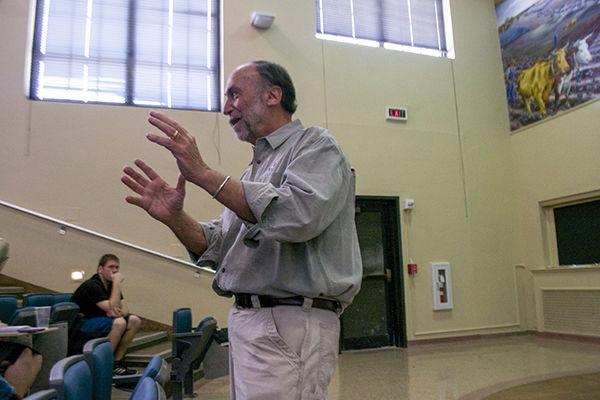Texas A&M anthropology department hosted its 16th annual “Shipwreck Weekend” this weekend to promote new developments within the field of nautical archeology.
The event included guest speakers Wendy Van Duivenvoorde and Arthur B. Cohn. In addition, Shipwreck Weekend also granted public access to laboratories and information about current research within the Texas A&M anthropology department.
Guests were provided opportunities to explore the anthropology building and gain an inside look into a field that often goes unrecognized.
The keynote speaker, Arthur B. Cohn, has worked in the field for over 35 years on the preservation of nautical archaeological sites. Cohn’s discussion focused on the management of shipwrecks, specifically Benedict Arnold’s gunboat “Spitfire,” which sunk in Lake Champlain, Vermont, during the American Revolution.
“Here’s a boat that is literally frozen in the early morning hours of October 12, 1776,” Cohn said., “The guys abandoned the boats, sank it perfectly on its bottom, to the point where, on the inside where the battle stations are, there is a wooden box with all the ammunition that hasn’t shifted at all, so it’s a quite extraordinary architectural find.”
Cohn said an issue, however, is that while the boat remains in good condition, the infiltration of mussels in the lakes surrounding the archeological site poses a threat to its preservation.
“This boat will not last where it is,” Cohn said. “It is under an environmental sentence that will ultimately turn into a pile of loose planks at the bottom.”
Although there is not a system in place to prevent the mussels from causing damage, Cohn believes it is the responsibility of the next generation of archaeologists to preserve these pieces of history.
“We have an obligation to make the case that there intrinsic values here. We need this stuff,” Cohn said. “It’s not just that we, as a society, should value our past and cultural connections. I’m saying that we need these sacred places that remind us of basic things, and this boat is one of them.”
George Bass, professor emeritus and founder of the Institute of Nautical Archeology, attended the event and said Shipwreck Weekend has continued to gain public attention through the years.
“I’ve been retired for 15 years but they’ve been going on for a while,” Bass said. “The whole idea was to bring in people, townspeople especially, and make them aware of what we are doing. Just sorta of get the word out and tell them what it’s all about, and it always seems to draw and fair amount of people.”
Karl Krusell, nautical archeology graduate student, said the event was a good way to shed light on the distinguished nautical archeology program at the university.
“What was cool was that we were able to advocate the management of shipwrecks to the public audience,” Krussel said. “In the world of nautical archeology, we all know these things and find them important, but a lot of times the public doesn’t. Texas A&M and is one of the only places in the world where you can study nautical archeology. I would argue it’s the best place in the world.”
Filipe Castro, associate professor in nautical archeology, said much of the general public is unaware of the advances made within the field.
“Archeologists publish only about 25 percent what they dig, so archeologist still do not publish enough, and the cost of this is that the general public still has no idea what we do,” Castro said.
Castro said the anthropology department is working with the College of Architecture and the Department of Visualization to digitally reconstruct archeological sites.
“Once we make this beautiful mesh of points, then the sky’s the limit,” Castro said. “In the viz lab, we are experimenting with computer graphics to reconstruct the sites and show people very clearly that a archeological site is not just a jumble of rotten timber, but we can really make it speak, and bring us back to that time.”
Talks shed light on nautical archeology
April 13, 2015

Photo by Jena Floyd
Guest speaker Arthur B. Cohn talks about the “Spitfire,” a ship that sunk in Lake Champlain, Vt. during the American Revolution.
0
Donate to The Battalion
$1815
$5000
Contributed
Our Goal
Your donation will support the student journalists of Texas A&M University - College Station. Your contribution will allow us to purchase equipment and cover our annual website hosting costs, in addition to paying freelance staffers for their work, travel costs for coverage and more!
More to Discover









